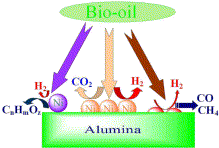Ni/Al2O3 is widely used catalyst for steam reforming of organics to hydrogen. However, Ni/Al2O3 catalyst is subject to coking, which leads to its fast deactivation during steam reforming. The coke formation related to not only the properties of the reactants but also the state of the nickel species on alumina. It is known that nickel oxide (NiO) is inert for steam reforming while the metallic nickel (Ni) is active. Therefore, the catalytic performance of Ni/Al2O3 catalyst is mainly determined by the characteristics of metallic Ni species on alumina.
 |
Researchers from Lanzhou Institute of Chemical Physics (LICP) of the Chinese Academy of Sciences (CAS) and University of Western Australia have identified, characterized, and tested three kinds of nickel species for steam reforming of bio-oil model compounds and investigated their catalytic activities for steam reforming of acetone and acetic acid. It is found that Ni species weakly interacted with alumina helps to activate acetone but it solely shows negligible reforming activity, while its integration with the Ni species mildly interacted with alumina is very active and efficient for steam reforming of not only acetone but also the by-products. In comparison, the presence of the Ni species strongly interacted with alumina promotes the generations of the by-products (i.e. CH4, CO) and coke. The suppression of its presence on catalyst surface can obtain a highly selective and stable Ni/Al2O3 catalyst. Different type of metallic species may also exist in other supported metal catalysts. Controlling the presence of a given species on catalyst surface may also pose remarkable effects on the catalytic reactions.
The work has received support from National Program on Key Basic Research Project of China (973 Program) and the findings have been published in Applied Catalysis A: General(Applied Catalysis A: General427– 428 (2012) 49– 57).
